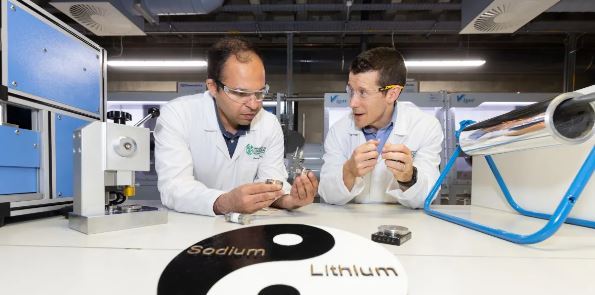Science
University of Limerick Unveils Groundbreaking Dual-Cation Battery

Researchers at the University of Limerick have achieved a significant breakthrough by developing the world’s first full-cell dual-cation battery. This innovative energy storage solution combines both lithium and sodium ions, potentially transforming the landscape of electric vehicles and portable electronics. The findings were detailed in a recent publication in the journal Nano Energy.
The project was spearheaded by Hugh Geaney, an Associate Professor in Chemistry at UL’s Department of Chemical Sciences, alongside Dr. Syed Abdul Ahad, a postdoctoral fellow supported by the Government of Ireland. Their work was conducted in collaboration with researchers from the University of Birmingham.
Revolutionizing Energy Storage
Traditional sodium-only batteries have been limited in their performance due to lower energy densities compared to their lithium counterparts. The newly developed dual-cation system leverages the strengths of both lithium and sodium ions, enhancing battery capacity and stability while primarily utilizing sodium, thus promoting sustainability.
“For the first time, we’ve shown that sodium-ion batteries can be ‘supercharged’ by pairing sodium and lithium in a sodium-dominant dual-cation electrolyte,” Geaney stated. He emphasized that this development paves the way for more sustainable and high-performance battery chemistries.
Dr. Abdul Ahad highlighted the advancements made with this dual-cation design, explaining, “By introducing both lithium and sodium cations, we actually double the battery’s capacity that would otherwise be lower in a typical sodium-ion battery.” This novel approach has not been previously achieved using the anode materials involved in the study, which are expected to exhibit high capacities for sodium-ion applications.
The design allows lithium ions to function as a “capacity booster” within the electrolyte. This feature enhances energy density, crucial for extending the range of electric vehicles, while also improving safety and reducing reliance on expensive and environmentally challenging materials like cobalt.
Implications for Future Technologies
Sodium-ion batteries have emerged as a more sustainable alternative to the widely used lithium-ion batteries. While sodium-ion systems traditionally exhibit lower energy density, this new dual-cation technology demonstrates that sodium ions can deliver robust performance. The combination of lithium and sodium enables the cell to cycle for up to 1,000 cycles, making it an environmentally friendly and cost-effective option.
The research received support from the Government of Ireland Postdoctoral Fellowship and the Research Ireland Frontiers for the Future programme. Moving forward, the research team plans to explore new material combinations and ion systems, including silicon-based anodes and alternative pairings such as lithium-magnesium and potassium-lithium.
This achievement is part of the ongoing work from the Geaney Research Group, which focuses on developing innovative materials for energy storage. With over 30 active researchers in UL’s battery cluster and the multidisciplinary AMPEiRE centre dedicated to battery and energy materials research, the University of Limerick continues to lead advancements in next-generation energy solutions.
In summary, the development of the full-cell dual-cation battery marks a significant milestone in energy storage technology. The innovative combination of lithium and sodium ions holds promise for sustainable and high-performance applications, positioning the University of Limerick at the forefront of battery innovation.
-

 Top Stories1 month ago
Top Stories1 month agoTributes Surge for 9-Year-Old Leon Briody After Cancer Battle
-

 Entertainment3 months ago
Entertainment3 months agoAimee Osbourne Joins Family for Emotional Tribute to Ozzy
-

 Politics3 months ago
Politics3 months agoDanny Healy-Rae Considers Complaint After Altercation with Garda
-

 Top Stories2 months ago
Top Stories2 months agoIreland Enjoys Summer Heat as Hurricane Erin Approaches Atlantic
-

 World3 months ago
World3 months agoHawaii Commemorates 80 Years Since Hiroshima Bombing with Ceremony
-

 Top Stories3 months ago
Top Stories3 months agoFianna Fáil TDs Urgently Consider Maire Geoghegan-Quinn for Presidency
-

 World3 months ago
World3 months agoGaza Aid Distribution Tragedy: 20 Killed Amid Ongoing Violence
-

 World3 months ago
World3 months agoCouple Convicted of Murdering Two-Year-Old Grandson in Wales
-

 Top Stories1 month ago
Top Stories1 month agoNewcastle West Woman Patricia Foley Found Safe After Urgent Search
-

 Top Stories2 months ago
Top Stories2 months agoClimbing Errigal: A Must-Do Summer Adventure in Donegal
-

 Top Stories2 months ago
Top Stories2 months agoHike Donegal’s Errigal Mountain NOW for Unforgettable Summer Views
-

 World3 months ago
World3 months agoAristocrat Constance Marten and Partner Convicted of Infant Murder









